De Amerikaanse letterkundige en literatuurwetenschapper Wayne Clayton Booth werd geboren op 22 februari 1921 in American Fork, Utah. Zie ook mijn blog van 22 februari 2010.
Uit: The Essential Wayne Booth
„Put even in its simplest terms, the problem Shakespeare gave himself in Macbeth was a tremendous one. Take a good man, a noble man, a man admired by all who know him-and destroy him, not only physically and emotionally, as the Greeks destroyed their heroes, but also morally and intellectually. As if this were not difficult enough as a dramatic hurdle, while you are transforming him into one of the most despicable mortals conceivable, maintain him as a tragic hero-that is, keep him so sympathetic that, when he comes to his death, the audience will pity rather than detest him; they must feel relieved to see him out of his misery rather than pleased to see him destroyed. Put in Shakespeare’s own terms: take a “noble” man, full of “conscience” and “the milk of human kindness,” and make of him a “dead butcher,” yet keep him an object of pity rather than hatred.
If we thus artificially reconstruct the problem as it might have existed before the play was written, we see that, in choosing these “terminal points” and these terminal intentions, Shakespeare makes almost impossible demands on his dramatic skill, although at the same time he insures that, if he succeeds at all, he will succeed magnificently. If the trick can be turned, it will inevitably be a great one.
One need only consider the many relative failures in attempts at similar “plots” and effects to realize the difficulties involved. When dramatists or novelists attempt the sympathetic-degenerative plot, almost always one or another of the following failures or transformations occurs:
1. The feeling of abhorrence for the protagonist becomes so strong that all sympathy is lost, and the play or novel becomes “punitive”-that is, the reader’s or spectator’s chief pleasure depends on his satisfaction in revenge or punishment.
2. The protagonist is never really made very wicked, after all; he only seems wicked by conventional (and, by implication, unsound) standards and is really a highly admirable reform-candidate.
3. The protagonist reforms in the end and avoids his proper punishment.“
4. The book or play itself becomes a “wicked” work; that is, either deliberately or unconsciously the artist makes us side with his degenerated hero against “morality.”

Wayne C. Booth (22 februari 1921 – 9 oktober 2005)
De Canadese schrijver Morley Callaghan werd geboren op 22 februari 1903 in Toronto. Zie ook mijn blog van 22 februari 2007.en ook mijn blog van 22 februari 2009 en ook mijn blog van 22 februari 2010.
Uit: Such Is My Beloved
„There was a freshness in the air that made him think of approaching spring. He passed a young man and a girl walking very close together and the girl’s face was so full of eagerness and love Father Dowling smiled. As soon as the mild weather came the young people began to walk slowly around the Cathedral in the early evening, laughing out loud or whispering and never noticing anybody who smiled at them. The next time Father Dowling, walking slowly, passed two young people, he smiled openly, they looked at him in surprise, and the young man touched his hat with respect. Father Dowling felt suddenly that he loved the whole neighborhood, all the murmuring city noises, the street cries of newsboys, the purring of automobiles and rumble of heavy vehicles, the thousand separate sounds of everlasting motion, the low, steady, and mysterious hum that was always in the air, the lights in windows, doors opening, rows of street lights and fiery flash of signs, the cry of night birds darting around the Cathedral and the soft low laugh of lovers strolling in the side streets on the first spring nights. He felt he would rather be here in the city and at the Cathedral than any place else on earth, for here was his own home in the midst of his own people.“
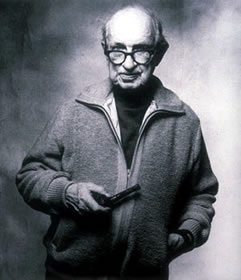
Morley Callaghan (22 februari 1903 – 25 augustus 1990)
De Franse schrijver Jules Renard werd geboren op 22 februari 1864 in Châlons-du-Maine. Zie ook mijn blog van 22 februari 2007 en ook mijn blog van 22 februari 2009 en ook mijn blog van 22 februari 2010.
Uit: Histoires naturelles
« Le cochon et les perles
Dès qu’on le lâche au pré, le cochon se met à manger et son groin ne quitte plus la terre.
Il ne choisit pas l’herbe fine. Il attaque la première venue et pousse au hasard, devant lui, comme un soc ou comme une taupe aveugle, son nez infatigable.
Il ne s’occupe que d’arrondir un ventre qui prend déjà la forme du saloir, et jamais il n’a souci du temps qu’il fait.
Qu’importe que ses soies aient failli s’allumer tout à l’heure au soleil de midi, et qu’importe maintenant que ce nuage lourd, gonflé de grêle, s’étale et crève sur le pré.
La pie, il est vrai, d’un vol automatique se sauve; les dindes se cachent dans la haie, et le poulain puéril s’abrite sous un chêne.
Mais le cochon reste où il mange.
Il ne perd pas une bouchée.
Il ne remue pas, avec moins d’aise, la queue. Tout criblé de grêlons, c’est à peine s’il grogne: – Encore leurs sales perles! »
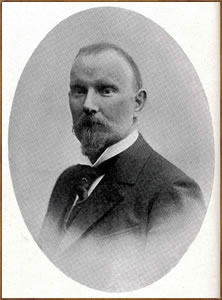
Jules Renard (22 februari 1864 – 22 mei 1910)
De Amerikaanse dichter, essayist, uitgever en diplomaat James Russell Lowell werd geboren op 22 februari 1819 in Cambridge, Massachusetts. Zie ook mijn blog van 22 februari 2007 en ook mijn blog van 22 februari 2009 en ook mijn blog van 22 februari 2010.
She Came And Went
As a twig trembles, which a bird
Lights on to sing, then leaves unbent,
So is my memory thrilled and stirred;–
I only know she came and went.
As clasps some lake, by gusts unriven,
The blue dome’s measureless content,
So my soul held that moment’s heaven;–
I only know she came and went.
As, at one bound, our swift spring heaps
The orchards full of bloom and scent,
So clove her May my wintry sleeps;–
I only know she came and went.
An angel stood and met my gaze,
Through the low doorway of my tent;
The tent is struck, the vision stays;–
I only know she came and went.
Oh, when the room grows slowly dim,
And life’s last oil is nearly spent,
One gush of light these eyes will brim,
Only to think she came and went.
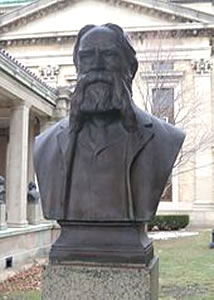
James Russell Lowell (22 februari 1819 – 12 augustus 1891)
Beeld in New York, campus City University
De Amerikaanse dichteres en schrijfster Edna St. Vincent Millay werd geboren op 22 februari 1892 in Rockland, Maine. Zie ook mijn blog van 22 februari 2009 en ook mijn blog van 22 februari 2010.
Tavern
I’ll keep a little tavern
Below the high hill’s crest,
Wherein all grey-eyed people
May set them down and rest.
There shall be plates a-plenty,
And mugs to melt the chill
Of all the grey-eyed people
Who happen up the hill.
There sound will sleep the traveller,
And dream his journey’s end,
But I will rouse at midnight
The falling fire to tend.
Aye, ’tis a curious fancy —
But all the good I know
Was taught me out of two grey eyes
A long time ago.
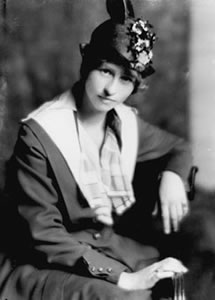
Edna St. Vincent Millay (22 februari 1892 – 19 oktober 1950)
De Duitse dichteres en schrijfster Ottilie Wildermuth werd geboren op 22 februari 1817 in Rottenburg am Neckar. Zie ook mijn blog van 22 februari 2009 en ook mijn blog van 22 februari 2010.
Zur Silberhochzeit
Mit blühenden Gewächsen.
Viel zu spät kommt alles heuer,
Frühlingsluft und Sonnenschein,
auch zu Eurer Silberfeier
stell’ ich fast zu spät mich ein.
Und mit reichen Hochzeitsgaben
wag ich kaum mich mehr hinaus,
alles soll ja reichlich haben
Euer wohlbestelltes Haus.
Eines wag ich doch zu bieten,
bitte, nehmet freundlich hin
auch die spät erschloss’nen Blüten
und der Treue friedlich Grün.
Denn die Liebe und die Treue
sind zu früh nicht, nicht zu spät.
Schön ist’s, dass sie blühen neue,
wenn bald kühler Herbstwind weht.
Lasset drum die Bäumchen stehen
gern vor Eurem trauten Haus,
mögt in Fried’ und Freude gehen
viele Jahre ein und aus.
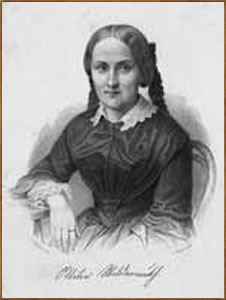
Ottilie Wildermuth (22 februari 1817 – 12 juli 1877)
Zie voor onderstaande schrijver ook mijn blog van 22 februari 2010.
De Ierse schrijver Sean O’Faolain werd geboren op 22 februari 1900 in Cork. Zie ook mijn blog van 22 februari 2007 en ook mijn blog van 22 februari 2009.
